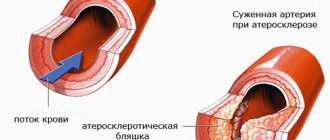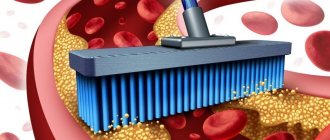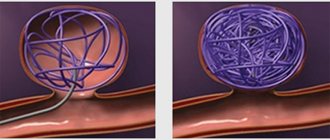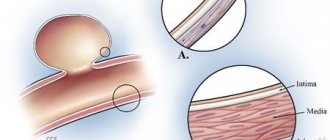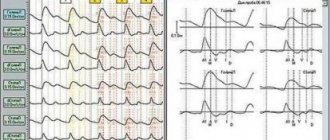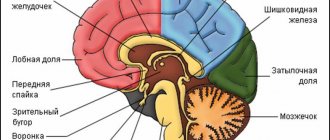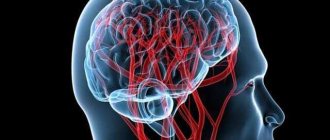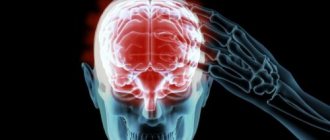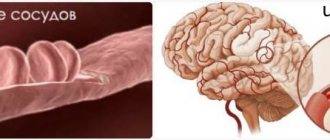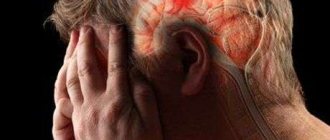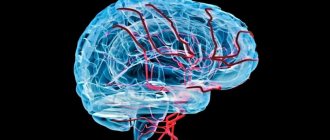Why does vasoconstriction occur?
To dilate the blood vessels of the brain, it is necessary to first determine what factors cause the spasm and narrowing of the vascular bed. It is by eliminating the cause of the disease that treatment must begin. Factors that provoke narrowing of arteries, capillaries, veins:
- Diet leading to obesity: consumption of fatty foods, baked goods, trans fats.
- Sedentary lifestyle.
- Sedentary work.
- Low physical activity or, conversely, too high.
- Excess weight.
- Nervous stress: stressful situations, nervous tension at work, emotional fatigue.
- Bad habits: smoking, excessive drinking, drug taking.
Has a person followed a special diet and a healthy lifestyle all his life? It has a chance to delay pathological vasoconstriction. But even absolutely healthy people cannot escape old age; after 70 years, capillaries, veins, and arteries lose elasticity, become thinner, become fragile, and break easily.
How to eat healthy
A proper balanced diet helps prevent the occurrence of various vascular problems. Here are the foods that should dominate your diet:
- Parsley, dill, celery, and any vegetable and fruit salads must be present on the table;
- Omega-3 and Omega-6 acids, which are abundant in seafood, not only lower the level of bad cholesterol, but also clear cholesterol plaques; All fish are healthy, only fried and smoked fish are not recommended;
- Chicken, turkey and lean veal are recommended for preparing meat dishes;
- Choose dairy products with a minimum percentage of fat.
Here are the foods whose consumption should be limited as much as possible:
- reduce or better yet completely abandon animal fats; there should be no lamb, pork, fatty cheeses and sausages, or butter on the table;
- stop drinking alcohol; it is indeed capable of dilating blood vessels, but the effect is so short-term that there is no need to talk about any benefit, but the harm with frequent use is obvious.
By following a diet and taking into account these simple recommendations, you can not only prevent the disease, but also keep the circulatory system in a normal state for a long time.
Mechanisms of vasoconstriction
Any vessel is a hollow organ that consists of several layers. The outer layer provides its mechanical contraction and expansion. With its help, the body regulates body temperature, dilating blood vessels when overheated and constricting when cooling. But if this mechanism fails, chronic long-term vasospasm may develop.
One of the reasons for the disruption of the mechanism of constriction and dilation of blood vessels is age. The older a person is, the less elastic his blood vessels are.
But there is another mechanism for vasoconstriction - the growth of plaques on its inner surface. Cholesterol and atherosclerotic plaques are deposited on it, which narrows the lumen of the vessel.
In some cases, vasoconstriction may be caused by several reasons, for example, an increase in cholesterol plaques and loss of elasticity of the walls of blood vessels.
In such cases, it is necessary to follow a set of measures that will help slow down the process of plaque growth, as well as loss of elasticity.
Nutrition tips
Proper nutrition always plays a vital role in restoring health. Some provisions contain such an amount of vitamins and minerals that they are practically not inferior to current medicines. Doctors assure that if you regularly consume suitable foods, the functioning of the circulatory system will be restored, and the walls of the capillaries will become more resilient. Helps dilate blood vessels:
- fruits with vitamin C; Apples, sweet peppers and oranges for atherosclerosis can be eaten in virtually unlimited quantities.
- food with vitamin B; Nuts, bananas, sprouted wheat, quail yolk not only contribute to the dilation of blood vessels, but are also an excellent prevention of atherosclerosis.
- magnesium-rich foods. Oatmeal, buckwheat, watermelon.
Causes
There is no one specific cause of vasoconstriction that, by eliminating it, can eliminate the risk of vasoconstriction. As a rule, this is a complex of factors that almost every modern person faces:
- Stressful situations at home or at work.
- Eating the “wrong” foods – smoked, fried, too salty, floury, sweet, fatty.
- Smoking and alcohol abuse.
- Sedentary lifestyle.
- Insufficient exposure to fresh air.
- Insomnia.
- Heavy workload and, as a result, fatigue at work and at home.
These causes of narrowed blood vessels lead to the formation of bad cholesterol in the body, which is deposited on the walls of blood vessels, forming atherosclerotic plaques that impair blood circulation.
There are many reasons for impaired conduction of blood vessels. In addition to possible congenital or infectious pathologies, they are created by modern life itself, full of stressful situations, with its rhythm, often depriving people of proper rest, sleep and proper nutrition, drinking alcohol (which dilates blood vessels for a while, and then greatly narrows them, causing irreparable harm) - and much more.
- Increased mental and physical stress.
- Stressful situations.
- Overwork at work.
- Nervous feelings.
- Rare walks, and as a result - lack of fresh air.
- A sedentary lifestyle, which means stagnant processes in the body.
- Poor or unhealthy diet - large amounts of high-calorie, fatty and fried foods. Lack of vegetables, seafood and fruits in the diet.
- Smoking, excessive drinking of alcohol, especially beer, which, in addition, leads to hormonal imbalance and obesity.
Many of these reasons lead to an increase in cholesterol levels in the blood and its deposition on the walls of blood vessels. This makes the vessels less passable, they lose their former elasticity.
These causes of narrowed blood vessels lead to the formation of bad cholesterol in the body, which is deposited on the walls of blood vessels, forming atherosclerotic plaques that impair blood circulation.
The causes of vasoconstriction are very diverse. They depend on the type of vessel, internal and external factors, and the duration of their exposure.
Domestic
Internal factors of vasoconstriction include:
- atherosclerotic damage to the vessel wall;
- inflammatory processes - swelling of the walls of blood vessels impairs blood flow;
- congenital pathology;
- endarteritis;
- thrombosis and embolism;
- metabolic disorders;
- for diabetes, obesity, thyrotoxicosis.
External
Arteries have a muscular layer, so they often react with spasms to unfavorable factors. During a spasm, small arteries are temporarily compressed, but if the spasms are frequent, then the vessels lose their ability to relax.
Contributing factors:
- smoking;
- alcohol consumption;
- stressful situations;
- hypothermia;
- development of vegetative-vascular dystonia;
- initial stages of ischemic and hypertension;
- frostbite of the extremities;
- Raynaud's syndrome.
Prolonged vasoconstriction is observed as a result of mechanical compression:
- severe injuries;
- tumor growth near blood vessels;
- pressing effect of bone tissue;
- prolonged improper use of a tourniquet to stop bleeding.
The main reason for the development of this disease is the adhesion of cholesterol plaques to the walls of blood vessels; the plaques grow like a snowball in a certain area until they completely block the lumen.
What causes high cholesterol levels:
- The scourge of our time is excess weight; unfortunately, already 30% of residents of all developed countries suffer from it. The passion for fast food has turned into a real cult, namely, fatty foods are so rich in cholesterol;
- Patients with diabetes mellitus, hypertension and atherosclerosis also experience cholesterol surges.
If medications can only be prescribed by a qualified specialist after a series of examinations, then vasodilating folk remedies for the brain can be prepared at home yourself.
Again, it is better to first consult with your doctor about certain medicinal herbs.
So what folk healing recipes help dilate blood vessels and improve cerebral circulation.
If we do not take into account various infectious and hereditary diseases, then first of all the cause of impaired conductivity of blood vessels is created by the person himself:
- Heavy physical activity;
- Emotional instability, which manifests itself in anxiety, aggression, nervousness. Stressful situations.
- Frequent overwork;
- Lack of oxygen.
- Sedentary lifestyle. With low human activity, stagnant processes form in the body.
- Harmful, unhealthy diet. Fatty foods, carcinogens, overeating. As a result, obesity can develop, which is one of the main causes of atherosclerosis.
- Bad habits. Alcohol and smoking abuse leads to hormonal imbalance in the body.
Many reasons contribute to the formation of cholesterol plaques on the walls of blood vessels, which reduces permeability, making them inelastic.
Bottom line
If treatment of atherosclerosis is carried out at the initial stage, it will be possible to get rid of the pathology with the help of folk remedies. But in order to achieve a positive effect in the shortest possible time, the approach must be comprehensive. The patient needs to reconsider his diet, get rid of bad habits and include sports in his life. Daily morning workouts (especially in the fresh air) will start the body's work and fill it with energy for the whole day. But in any case, therapy can only be done after consulting a doctor.
Symptoms
In recent years, the problem of vascular stenosis in the brain has ceased to be a problem only for the older generation.
Stenosis of cerebral vessels, unfortunately, is not uncommon even in young people. This is due to poor nutrition, eating too fatty foods, smoking, drinking alcoholic beverages, and consuming fast food; these are the factors that lead over time to a deterioration in the condition of cerebral vessels in young people.
Among the symptoms of cerebral vasoconstriction, the following should be highlighted:
- Headache.
- Ringing in the ears.
- Dizziness.
- Fast fatiguability.
- Drowsiness.
- Memory impairment.
If you notice these symptoms of narrowed blood vessels, you should immediately consult a doctor, because this can subsequently lead to myocardial infarction or stroke. It should be noted that the age of these diseases has also become younger in the last decade and these are no longer diseases of older people.
Unfortunately, in our time, such a phenomenon as narrowing of cerebral vessels occurs not only in older people, but also in fairly young people, and there are reasons for this. Eating unhealthy food, drinking alcohol, smoking cigarettes - all this leads to clogged blood vessels. The symptoms of this disease can be noticed immediately, as they manifest themselves every day.
- The onset of the disease is frequent paroxysmal headaches.
- Dizziness and faintness.
- Noises in the ears.
- Memory impairment or loss.
- Increased fatigue.
- Decreased performance.
Once you feel these symptoms, you should not ignore them, otherwise they can lead to a stroke or heart attack. If such symptoms appear in an elderly person, the disease can lead to senile dementia.
If you notice these symptoms of narrowed blood vessels, you should immediately consult a doctor, because this can subsequently lead to a heart attack or stroke. It should be noted that the age of these diseases has also become younger in the last decade and these are no longer diseases of older people.
Signs of the chronic form usually develop gradually, so a person has time to get used to their appearance, adapts to the disease, and therefore does not pay the necessary attention to treatment.
Chronic vasoconstriction has three stages of development, and without appropriate treatment they can take several years to develop.
First stage
The following symptoms are characteristic of this stage:
- frequent mood swings, irritability;
- subtle decrease in performance and concentration;
- fast fatiguability;
- periodic headaches.
Second stage
Signs of the disease are increasing. Tinnitus is added to those previously mentioned. There is also memory impairment, prolonged migraines, decreased concentration, and sometimes short-term fainting.
Third stage
In the initial stages of the disease, it can be quite difficult to understand that the blood vessels of the brain are affected. Treatment (drugs, as already mentioned, should be selected only by a specialist) is often prescribed untimely.
In most cases, this is due to late presentation of patients to the hospital. You need to start worrying when the first symptoms appear - fatigue, decreased performance, memory loss.
Any dizziness, lack of coordination, hearing problems, or tinnitus should alert you.
It is important to know that the brain is extremely sensitive to any problems with the supply of nutrients to it. If the blood flow stops, the death of nerve cells begins within 5 minutes.
But even small disruptions are enough for memory and motor reactions to deteriorate. In some cases, this can lead to disability or cause death.
Therefore, it is so important to pay attention to the first “bells” of the body and consult a doctor in time. Also, do not refuse the prescribed treatment and be afraid that you will have to take some pills for the rest of your life.
This imposes certain restrictions (you will have to change your usual lifestyle, adjust your diet, etc.), but it reduces the risk of coronary heart disease, strokes and other cerebrovascular diseases.
Vinpocetine
The main effect of this drug is the activation of cerebral blood flow. This effect is realized by enabling the following mechanisms:
the accumulation of cAMP is stimulated, the increasing concentration of which entails dilation of cerebral vessels;
- the ability of platelets to aggregate decreases, which effectively prevents excessive thrombus formation;
- red blood cells are better deformed, therefore, they pass better through the smallest vessels.
All this contributes to the fact that blood begins to circulate more actively. Moreover, the effect manifests itself exactly where ischemia occurs. This determines the indications for the use of Vinpocetine:
- transient ischemic attacks (TIA);
- ACVA of ischemic type;
- rehabilitation after stroke;
- recovery after TBI;
- encephalopathy of various origins;
- vascular dementia;
- cerebral atherosclerosis.
The medication is available in two dosage forms. The first is a solution in ampoules, which requires injections. And the second is tablets for oral administration.
If a patient is being treated in a hospital setting, he is more likely to be given injections. But if the treatment is carried out at home, then, of course, it would be better to prescribe pills.
Among the contraindications to the use of Vinpocetine:
- individual intolerance;
- period of pregnancy and lactation;
- stroke of hemorrhagic type in the acute phase;
- IHD, severe;
- disturbances of heart rhythm and conduction.
Among the possible side effects, the most common are those related to the heart. This is possible tachycardia, extrasystole, as well as various types of arrhythmias. All this limits the use of the drug in the treatment of patients suffering from cardiac diseases.
Diagnostics
Diagnosis of the disease consists of several complementary forms of examination.
If it has been determined that you have cerebral atherosclerosis, medications should only be selected by a specialist. It is impossible to underestimate the harm that can be caused to the body due to deterioration in the patency of the arteries due to the formation of plaques on their walls.
After all, all this leads to a decrease in the elasticity of blood vessels, and cracks appear in them. And blood clots often form in places of damage.
Some clots can completely block the artery and cause the tissue in its bed to simply die.
It is better to check your health status if you notice periodic dizziness, decreased performance, malaise, or sleep problems.
It is better to check your health status if you notice periodic dizziness, decreased performance, malaise, or sleep problems.
Stimulants
If problems arise with the arteries that supply the brain, it is important that complex therapy be prescribed. It is necessary to carry out not only strengthening of the blood vessels of the brain. The drugs should also stimulate tissue metabolism, improve regeneration and trophic processes.
For these purposes, drugs such as Actovegin, Pyritinol, Gliatilin, Tanakan, Vazobral and other similar medications are intended.
Actovegin helps to increase the level of ATP, amino acids, and normalize metabolism in cells. It also increases the utilization of glucose in cells and the level of oxygen consumption.
The drug "Vazobral" is intended to reduce the aggregation of red blood cells and platelets. It reduces the permeability of vessel walls, increases the number of functioning capillaries, improves metabolic and circulatory processes occurring in the brain. It contains caffeine, which increases stimulation in the cerebral cortex, thereby increasing performance and reducing fatigue.
Treatment tactics
Complex therapy includes the prescription of a number of medications. It is necessary to take not only drugs that dilate blood vessels in the brain, but also drugs that improve blood circulation, thin the blood and reduce the likelihood of blood clots.
An important role in the treatment process is given to nootropics, which are designed to restore nerve cells and improve microcirculation in tissues.
During therapy, it is important to enhance the conduction of nerve impulses, strengthen the walls of blood vessels, accelerate the absorption of glucose, and remove free radicals that can destroy cell walls. It is also necessary to improve cerebral circulation. This is achieved with the help of drugs that relieve spasms and dilate capillaries.
If you notice that your body is beginning to malfunction, do not let things take their course, consult a doctor and take the recommended tests. Having assessed their results, the specialist will select medications for your cerebral vessels.
These could be medications that relieve spasms, improve blood circulation, dilate blood vessels, or drugs that help improve the absorption of oxygen by soft tissues. The choice of one medication or another depends on the nature of the pathology and the degree of its severity.
Attempting to choose medications for the cerebral vessels on your own, without the advice of a doctor, can only cause the condition to worsen. After all, a specialist must evaluate blood tests, ultrasound, CT and MRI results.
During therapy, it is important to enhance the conduction of nerve impulses, strengthen the walls of blood vessels, accelerate the absorption of glucose, and remove free radicals that can destroy cell walls. It is also necessary to improve cerebral circulation. This is achieved with the help of drugs that relieve spasms and dilate capillaries.
Means to improve blood circulation
One of the main tasks is to normalize the flow of all necessary substances into the brain. Comprehensive treatment of pathologies arising from problems with blood vessels should be aimed not only at improving blood circulation. It is also important to restore brain activity. For these purposes, medications such as Piracetam, Picamelon, Nootropil, Memotropil, Lucetam, Cerebrolysin and others can be used. All of them are nootropic drugs that can be used to cleanse the blood vessels of the brain. The drugs help improve microcirculation in problem areas and the passage of necessary metabolic processes. Their action is also aimed at inhibiting platelet aggregation, as a result of which the latter do not stick together so actively.
The drugs have a protective effect on the brain in case of damage caused by electric shock, intoxication, and hypoxia. In addition, they help improve its overall performance. Separately, it is worth noting that this group of drugs does not have any psychostimulating or sedative effect.
Drug therapy
In some cases, it is not enough just to change your lifestyle and adjust your diet to improve the condition of blood vessels. Then the doctor prescribes certain drugs directly for this purpose.
So, how to dilate blood vessels? You should not self-medicate by choosing pills yourself, since each medicine has its own side effects and contraindications.
To dilate blood vessels and restore blood circulation in the brain, several groups of drugs are used. You cannot select medications on your own.
This should be done by a doctor after examination and diagnosis. Medicines have contraindications and side effects, and in order to find the optimal combinations, you need to take into account all the individual characteristics of the patient and concomitant diseases.
Vasodilators include drugs of several groups.
Calcium antagonists
These tablets help improve cellular metabolism, relax arteries, and change the tone of veins. Thanks to them, blood flow increases, blood flows to the brain. The first generation includes:
- Nifedipine,
- Verapamil,
- Diazem.
To the second generation:
- Felodipin,
- Gallopamine,
- Isradipin.
New generation drugs are more effective, have fewer side effects and act more selectively. These include medications that act specifically on the blood vessels of the brain. Among them:
- Amlodipine,
- Lecarnidipine,
- Lacidipine.


